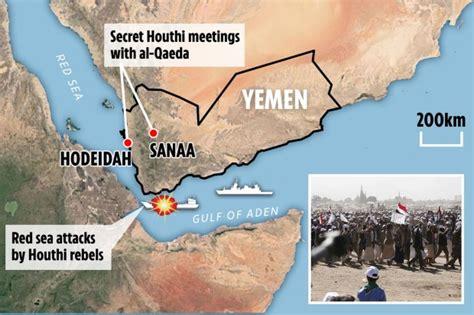
FORCES OF EVIL Iran-backed Houthis ‘hold secret terror meetings with al-Qaeda chiefs to plot horrific wave of suicide attacks on West’
THE Iran-sponsored Houthi rebels allegedly held secret terror meetings with al-Qaeda to plot a wave of “suicide attacks” against the West, sources revealed.
The Yemen-based militia reportedly tried to “persuade” their Islamist terrorist allies to join their fight in the Red Sea to help inflict further pain on their “mutual enemies”.
According to Yemeni sources, the meetings were held in both Yemen’s capital Sanaa as well as Hodeidah, the Houthi Red Sea port stronghold.
Clerics loyal to the Houthis met with al-Qaeda chiefs in an apparent bid to convince them to carry out their “legitimate duty” to confront western “aggression”, Sky News Arabia reported.
The terror talks came after Yemeni government officials accused the militia group of carrying out recent assassinations in the city of Aden alongside members of al-Qaeda.
For over two years, al-Qaeda in the Arabian Peninsula – which the US classes as the terror group’s most dangerous branch – has been clashing with government forces as its renewed insurgency inside Yemen grows.
The terror group, previously led by Osama Bin Laden and responsible for the 9/11 attacks, appears to now be taking advantage of the escalating crisis in Yemen and across the Red Sea to launch further attacks.
It follows months of indiscriminate maritime assaults by the Houthis, who control most of Yemen, on commercial vessels as well as US and UK navy warships in the Red Sea.
The rebels state their intention is to avenge Israel’s offensive in Gaza against Hamas, but they are targeting ships with little or no link to Israel – turning one of the world’s biggest shipping lanes into an active warzone.
Around 12 percent of all global trade normally passes through the Bab al-Mandeb Strait, the now-under-attack 20 mile-wide stretch of Red Sea also known as the “Gate of Tears”.
In a fresh round of Houthi assaults on Wednesday evening, two cargo ships sailing close to the Gulf of Aden came under attack from anti-ship ballistic missiles and the US Navy was forced to intervene.
It appeared to be a direct response to US and UK forces once again targeting Houthi military bases across Yemen in a nighttime blitz on Monday.
Four RAF Typhoon jets unleashed laser-guided bombs to blast eight sites, while US warships, submarine-launched Tomahawk missiles and fighter jets took out missile storage sites and launches.
It provoked a furious response from the trigger-happy rebels who vowed the attacks “would not go unpunished”.
It came just hours after Rishi Sunak and Joe Biden warned the Iranian-backed militants they would strike Yemen again “if needed” after a meticulously planned operation earlier this month.
Foreign Secretary David Cameron said the strikes sent the “clearest possible message”.
He said: “Since we last took action 10 days ago, there have been over 12 attacks on shipping by the Houthis in the Red Sea. These attacks are illegal, they are unacceptable.
“What we have done again is send the clearest possible message that we will continue to degrade their ability to carry out these attacks while sending the clearest possible message that we back our words and our warnings with action.”
It marked another dramatic escalation in the crisis that since November has been threatening to ignite an all-out war across the region, which has become a powder keg due to Israel’s ongoing war with Hamas.
The exploding tensions have led to discussions for Britain’s biggest warship to be deployed to the Red Sea to help spearhead strikes on Houthi targets.
Calls are growing for the £3.5billion aircraft carriers, the HMS Queen Elizabeth and its sister HMS Prince of Wales, to enter the crisis and help protect Britain and its allies interests.
On Monday, two US Navy Seals were confirmed as dead after a 10-day search for the pair after they went missing during a mission to seize Iranian arms.
Last week, Washington reclassified the Houthis as a terrorist organisation as they ramped up diplomatic and financial pressure on the militia group.
It followed US intelligence claiming that the Houthis were attempting to acquire more weapons to intensify their Red Sea attacks.
The intel revealed the rebels have been carefully curating their plan of attack – pinpointing when the strikes would be ramped up and how they would gather the necessary weapons.
There are concerns the militants will receive even more lethal weapons from Tehran – their long-term partner and backer – in the weeks to come.
Source » thesun.co.uk





